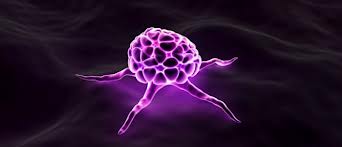 Transformation of normal cells into maliganant cells
Transformation of normal cells into maliganant cells
The genes that normally regulate cell growth and division during the cell cycle include genes for growth factors, their receptors, and the intracellular molecules of signaling pathways.
Mutations that alter any of these genes in somatic cells can lead to cancer. The agent of such change can be random spontaneous mutation. However, it is likely that many cancer–causing mutations result from environmental influences, such as chemical carcinogens, X – rays and other high–energy radiation, and some viruses.
Proto–oncogenes are a group of genes that cause normal cells to become cancerous when they are mutated. Mutations in proto–oncogenes are typically dominant in nature, and the mutated version of a protooncogene is called an oncogene.
 p53 gene has been called as the "guardian angel of the genome".
p53 gene has been called as the "guardian angel of the genome".
In addition to genes whose products normally promote cell division, cells contain genes whose normal products inhibit cell division. Such genes are called tumor – suppressor genes because the proteins they encode help prevent uncontrolled cell growth. Any mutation that decreases the normal activity of a tumor–suppressor protein may contribute to the onset of cancer, in effect stimulating growth through the absence of suppression.
The p53 gene, named for the 53,000 – Dalton molecular weight of its protein product, is a tumor–suppressor gene. The p53 gene has been called the "guardian angel of the genome". Once the gene is activated–for example, by DNA damage–the p53 protein functions as an activator for several other genes. Often it activates a gene called p21, whose product halts the cell cycle by binding to cyclin–dependent kinases, allowing time for the cell to repair the DNA. In addition, the p53 protein can turn on genes directly involved in DNA repair. Finally, when DNA damage is irreparable, p53 activates "suicide" genes, whose protein products bring about programmed cell death (apoptosis). Thus, p53 acts in several ways to prevent a cell from passing on mutations due to DNA damage. If mutations do accumulate and the cell survives through many divisions–as is more likely if the p53 tumor–suppressor gene is defective or missing – cancer may ensue.